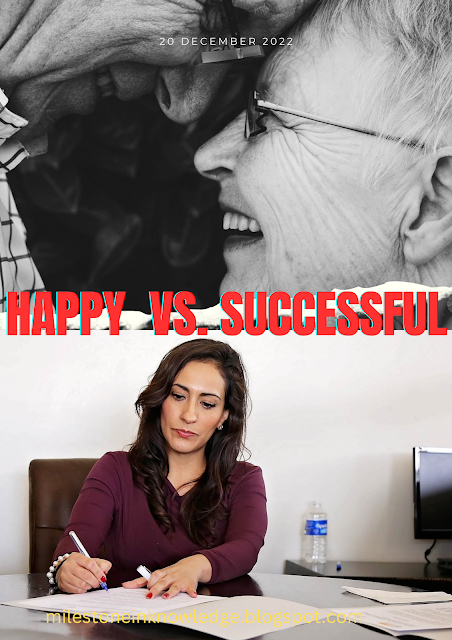In the pursuit of a fulfilling life, many of us aspire to either be successful or to achieve happiness. Often, these two concepts are intertwined, leading us to believe that success inevitably breeds happiness or vice versa. However, upon closer examination, it becomes evident that happiness and success are distinct entities, each with its own set of characteristics and determinants. Understanding the differences between the two can provide valuable insights into how we approach our goals and measure our overall well-being.
Defining Success and Happiness
Success is typically associated with accomplishments, achievements, and reaching predefined goals. It is often quantifiable and measurable, with benchmarks such as wealth, status, career progression, and recognition serving as indicators. Success can manifest in various domains of life, including career, education, relationships, and personal development.
On the other hand, happiness is a subjective and multifaceted emotional state characterized by feelings of contentment, joy, fulfillment, and overall satisfaction with life. It encompasses both positive emotions and a sense of well-being that transcends external circumstances. Happiness is influenced by factors such as personal values, relationships, experiences, health, and a sense of purpose or meaning in life.
The Pursuit of Success
For many individuals, the pursuit of success becomes a driving force in their lives. Whether it's climbing the corporate ladder, amassing wealth, achieving academic excellence, or attaining fame, the desire for success can be a powerful motivator. Success often involves setting goals, overcoming obstacles, and making sacrifices along the way. It requires ambition, perseverance, discipline, and sometimes a willingness to take risks.
While success can bring a sense of accomplishment and validation, it is not necessarily synonymous with happiness. The relentless pursuit of external markers of success, such as wealth or status, may lead to stress, burnout, and a lack of fulfillment if it comes at the expense of personal well-being, relationships, or values. Moreover, success can be fleeting, as the attainment of one goal often leads to the setting of new objectives, perpetuating a cycle of striving and dissatisfaction.
The Quest for Happiness
In contrast to the outward-focused nature of success, happiness is often found in the present moment and within oneself. It involves cultivating positive emotions, nurturing relationships, practicing gratitude, and engaging in activities that bring joy and fulfillment. While external circumstances can influence happiness to some extent, research suggests that internal factors, such as mindset and perspective, play a significant role in determining one's overall happiness.
Happy people tend to have strong social connections, a sense of belonging, and a positive outlook on life. They prioritize experiences over material possessions, savor life's simple pleasures, and embrace challenges as opportunities for growth. Rather than chasing after an elusive ideal of success, they focus on living authentically, aligning their actions with their values, and finding meaning in their daily lives.
Finding Balance and Integration
While success and happiness are distinct concepts, they are not mutually exclusive. It is possible to be successful and happy simultaneously, but it requires a balance between external achievements and internal well-being. Instead of viewing success and happiness as separate pursuits, it may be more beneficial to integrate them into a holistic approach to life.
This integration involves defining success on your own terms, based on what truly matters to you, rather than society's standards or external expectations. It means prioritizing self-care, nurturing relationships, and cultivating a sense of purpose and fulfillment in all aspects of life. It also entails recognizing that true success is not measured solely by external accomplishments but by the quality of one's relationships, the depth of one's experiences, and the degree of one's happiness and well-being.
Conclusion
In conclusion, while success and happiness are often conflated, they represent distinct dimensions of human experience. Success is characterized by external achievements and accomplishments, while happiness is an internal state of well-being and contentment. While the pursuit of success can contribute to happiness, it is not a guarantee of it, and the relentless pursuit of success at the expense of happiness may ultimately lead to dissatisfaction and burnout.
Ultimately, finding a balance between success and happiness involves aligning one's actions with one's values, fostering meaningful connections, and prioritizing personal well-being. By recognizing the differences between success and happiness and integrating them into a cohesive life philosophy, individuals can cultivate a more fulfilling and authentic way of living.








.png)
0 Comments